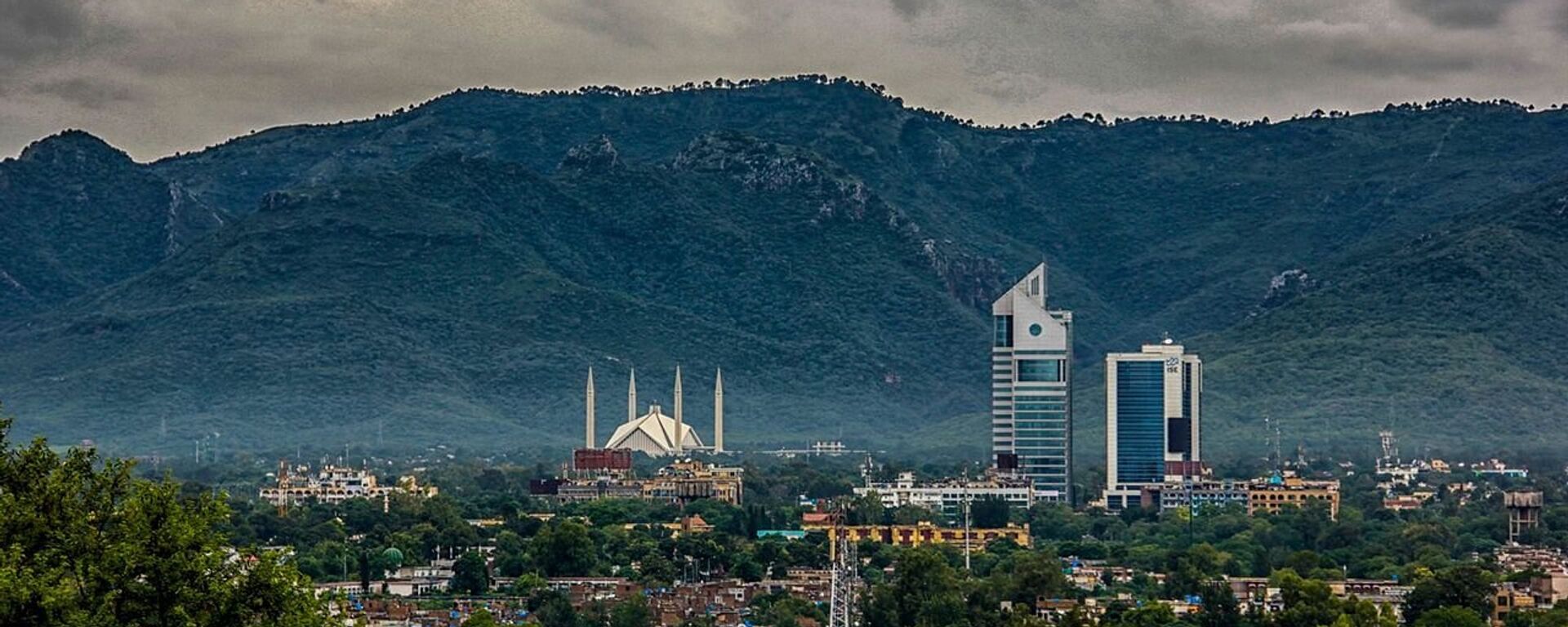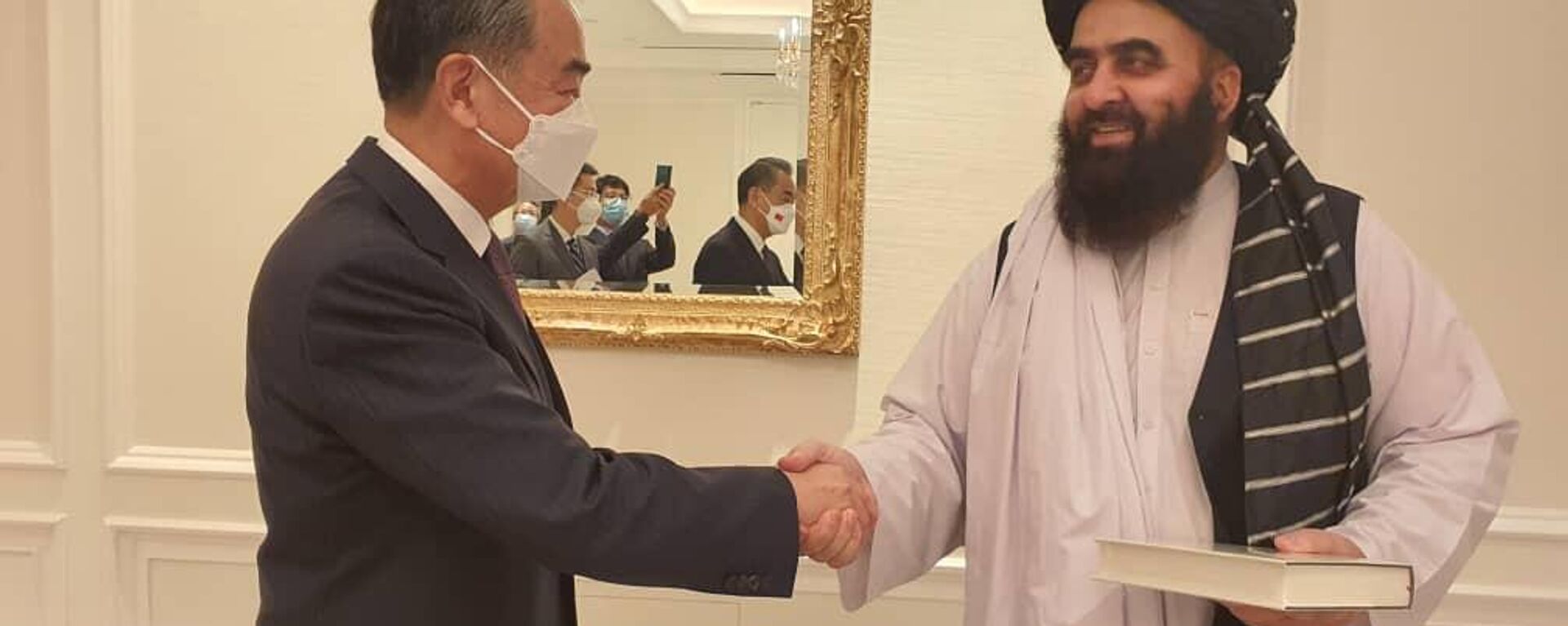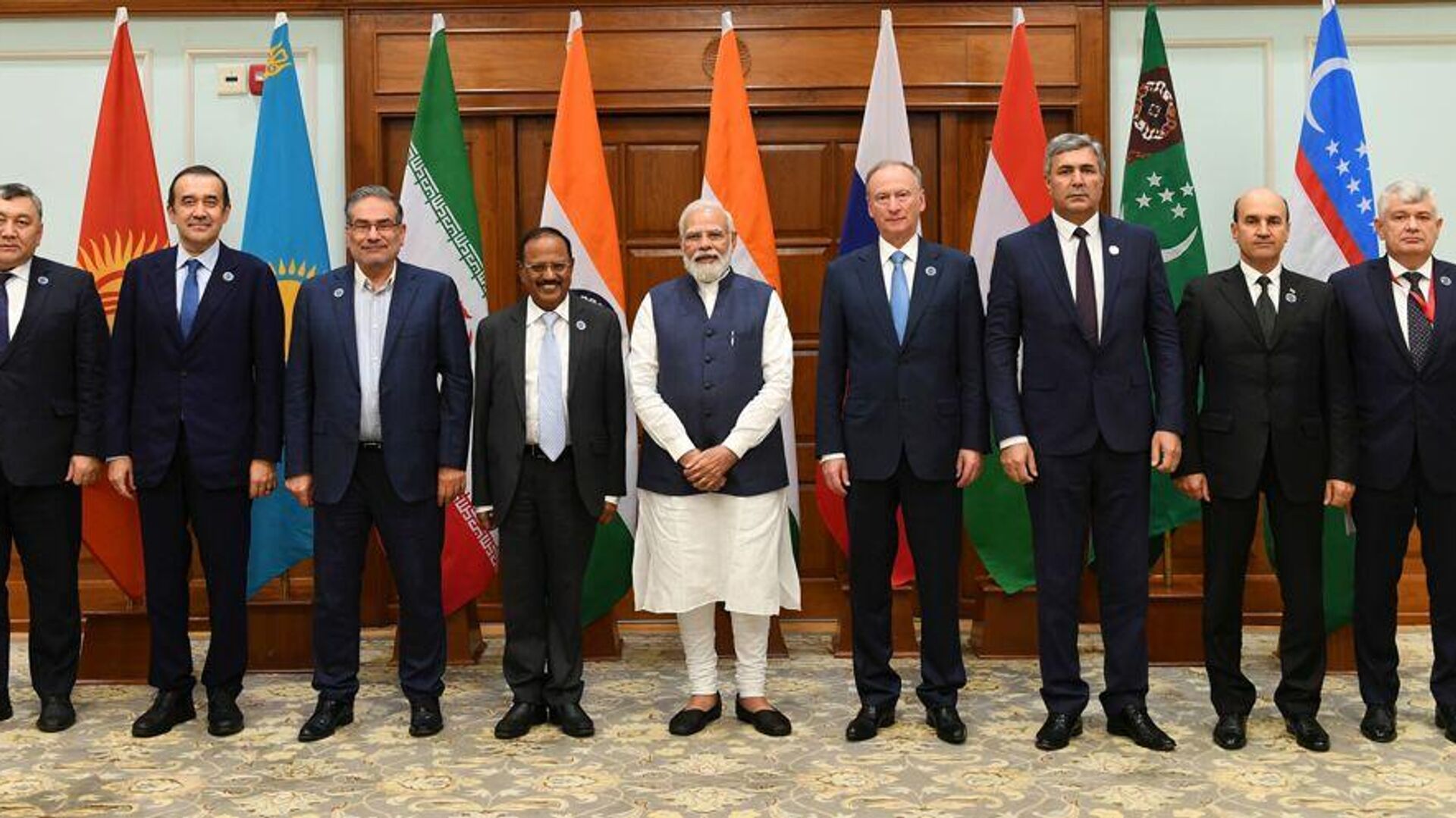https://sputnikglobe.com/20211111/delhi-declaration-showcases-indias-ability-to-shape-regional-discourse-on-afghanistan-professor-1090629540.html
Delhi Declaration Showcases India's Ability to Shape Regional Discourse on Afghanistan: Professor
Delhi Declaration Showcases India's Ability to Shape Regional Discourse on Afghanistan: Professor
Sputnik International
On Wednesday, the national security advisers (NSA) of eight regional countries - India, Iran, Kazakhstan, Kyrgyzstan, Russia, Tajikistan, Turkmenistan, and... 11.11.2021, Sputnik International
2021-11-11T13:32+0000
2021-11-11T13:32+0000
2021-11-11T13:32+0000
afghanistan
pakistan
turkmenistan
uzbekistan
nikolai patrushev
delhi
central asia
narendra modi
china
iran
https://cdn1.img.sputnikglobe.com/img/07e5/0b/0a/1090620410_87:0:971:497_1920x0_80_0_0_db342d9ac44939d6e82f3ec882214df0.jpg
The top security officials of eight countries have called for an "open and truly inclusive government" in Afghanistan and vowed to ensure that Afghanistan's soil not be used for planning terrorist activities. The Delhi Declaration, issued after the event, also called for cooperation to tackle radicalisation, extremism, separatism, and drug trafficking in the region.The Delhi Regional Security Dialogue was the first multilateral meeting on Afghanistan convened by India.Sputnik spoke with Professor Harsh V. Pant, the director of the Strategic Studies Programme at the New Delhi-based think tank Observer Research Foundation, on the debate and discussion during the dialogue and its importance for India.Sputnik: The Delhi Declaration emphasised non-interference in the internal matters of Afghanistan, but at the same time stressed the need to ensure an open and truly inclusive government. How do you see this?Harsh V Pant: The Delhi Declaration, which talks about non-interference in the internal matters of Afghanistan, I think, is to reassure various stakeholders in Afghanistan that countries like India and those who participated in Wednesday's meeting have no intention of dictating what kind of government Afghanistan should have, but I think the principles on which the government should be formed, it should be inclusive. If it is not inclusive and not participatory, including all stakeholders, then instability will be endemic in Afghanistan. So, I think that's the message that the Delhi Declaration has been emphasising.Sputnik: India is yet another country to host a multilateral event on Afghanistan. The world already has the UNSC, G20, Moscow Format, Troika, etc. What is the purpose of holding another multilateral event on Afghanistan as it seems everyone has the same concerns regarding Afghanistan?Harsh V Pant: This is an India-led initiative. So, India wants to be part of the dialogue on Afghanistan. There has been a lot of debate whether India has been marginalised in Afghanistan, and whatever has happened since the Taliban* takeover of Afghanistan has underscored that India cannot be marginalised. India's concerns are the concerns that are widely shared, including by the countries that participated today, and those concerns are being reflected in the Delhi Declaration. The Taliban and those who want to govern Afghanistan will have to take the issues raised in the Delhi Declaration into account. So, thus, this platform showcases India's ability to shape regional discourse on matters pertaining to Afghanistan, i.e., terrorism, extremism, drug trafficking, etc.Sputnik: The Russian security chief urged countries to include more issues of common concern. What are the problems that these regional countries may include in their dialogue in the future?Harsh V. Pant: When we talk of other issues of common concern, whether they are narco-trafficking, migration, environmental concerns, terrorism, there is a broader consensus on all of these concerns, at least in those countries who have participated in India. I think what the Russian security chief might be calling for is that there are lots of issues on the table, and those issues should be taken forward. They will be taken forward in this format because Central Asia, Russia, Iran, and India have common regional concerns. Those regional concerns reflect the kind of discussion and debate that happened today.Sputnik: China and Pakistan did not attend the Delhi Regional Security Dialogue. Do you think this weakens the efforts to solve the Afghan issue and could they further complicate the situation?Harsh V Pant: I think China and Pakistan decided not to attend this dialogue for their own reasons. Pakistan did not participate, which is very obvious. Pakistan's whole approach to Afghanistan is to look at Afghanistan through the prism of strategic depth. Pakistan's entire foreign policy is about India. So, the question that increasingly the world has to ask and is already asking is - whether Pakistan can be a responsible stakeholder when it comes to Afghanistan - as the whole idea is to look at Afghanistan as a protectorate rather than an independent sovereign nation that can take its own decisions. I do not think other countries would want to have anything to do with that. Regional states would like Afghanistan as a stable, peaceful country - peace with itself and its neigbours. It is something that Pakistan inherently does not want because it wants a client country in Afghanistan, and that's the challenge that Pakistan will have to resolve for its own sake as we are already looking at extremism rising in Pakistan. For China, because its entire Afghanistan policy premised on Pakistan, it was very clear that China would not participate if Pakistan was not participating. But long-term solutions to Afghanistan will come if all countries can work together. By inviting China and Pakistan, India made it very clear that India has no interest in excluding anyone. I think Pakistan's desire to see India as a so-called spoiler is a real problem.Sputnik: The Taliban welcomed the Delhi Regional Security Dialogue. How do you see this from the perspective of New Delhi?Harsh V. Pant: The Taliban's welcoming of the Delhi Regional Security Dialogue indicates that the Taliban acknowledges India is a vital stakeholder in Afghanistan and that Indian concerns will have to be seriously examined. That is being reflected in what the Taliban has said. I think it is also a reflection of the fact that for all those who claimed that India is irrelevant in Afghanistan, it is entirely clear that three months after the Taliban takeover, the continuing instability underscores all the challenges that India had long been talking about when it comes to Afghanistan and unless Indian concerns are taken on board, it will be very difficult to look at a viable future for Afghanistan.*An organisation under UN sanctions for terrorist activities.
https://sputnikglobe.com/20211110/pakistan-to-hold-extended-troika-meeting-after-indias-summit-on-afghanistan-invites-taliban-1090615355.html
https://sputnikglobe.com/20211026/afghan-soil-will-not-be-used-against-china-assures-taliban-leader-after-meeting-with-wang-yi-1090222063.html
pakistan
turkmenistan
uzbekistan
delhi
central asia
china
iran
afghanistan
Sputnik International
feedback@sputniknews.com
+74956456601
MIA „Rosiya Segodnya“
2021
Rishikesh Kumar
https://cdn1.img.sputnikglobe.com/img/07e4/08/04/1080055820_0:0:388:389_100x100_80_0_0_40018ee210946d65d49ffba4f4c008e1.jpg
Rishikesh Kumar
https://cdn1.img.sputnikglobe.com/img/07e4/08/04/1080055820_0:0:388:389_100x100_80_0_0_40018ee210946d65d49ffba4f4c008e1.jpg
News
en_EN
Sputnik International
feedback@sputniknews.com
+74956456601
MIA „Rosiya Segodnya“
Sputnik International
feedback@sputniknews.com
+74956456601
MIA „Rosiya Segodnya“
Rishikesh Kumar
https://cdn1.img.sputnikglobe.com/img/07e4/08/04/1080055820_0:0:388:389_100x100_80_0_0_40018ee210946d65d49ffba4f4c008e1.jpg
pakistan, turkmenistan, uzbekistan, nikolai patrushev, delhi, central asia, narendra modi, china, iran, afghanistan, taliban, security, drug trafficking, ajit doval
pakistan, turkmenistan, uzbekistan, nikolai patrushev, delhi, central asia, narendra modi, china, iran, afghanistan, taliban, security, drug trafficking, ajit doval
Delhi Declaration Showcases India's Ability to Shape Regional Discourse on Afghanistan: Professor
On Wednesday, the national security advisers (NSA) of eight regional countries - India, Iran, Kazakhstan, Kyrgyzstan, Russia, Tajikistan, Turkmenistan, and Uzbekistan - met in New Delhi at the Delhi Regional Security Dialogue on Afghanistan.
The top security officials of eight countries have called for an "open and truly inclusive government" in Afghanistan and vowed to ensure that Afghanistan's soil not be used for planning terrorist activities. The Delhi Declaration, issued after the event, also called for cooperation to tackle radicalisation, extremism, separatism, and drug trafficking in the region.
The
Delhi Regional Security Dialogue was the first multilateral meeting on Afghanistan convened by India.
Sputnik spoke with Professor Harsh V. Pant, the director of the Strategic Studies Programme at the New Delhi-based think tank Observer Research Foundation, on the debate and discussion during the dialogue and its importance for India.
Sputnik: The Delhi Declaration emphasised non-interference in the internal matters of Afghanistan, but at the same time stressed the need to ensure an open and truly inclusive government. How do you see this?
Harsh V Pant: The Delhi Declaration, which talks about non-interference in the internal matters of Afghanistan, I think, is to reassure various stakeholders in Afghanistan that countries like India and those who participated in Wednesday's meeting have
no intention of dictating what kind of government Afghanistan should have, but I think the principles on which the government should be formed, it should be inclusive. If it is not inclusive and not participatory, including all stakeholders, then instability will be endemic in Afghanistan. So, I think that's the message that the Delhi Declaration has been emphasising.
Sputnik: India is yet another country to host a multilateral event on Afghanistan. The world already has the UNSC, G20, Moscow Format, Troika, etc. What is the purpose of holding another multilateral event on Afghanistan as it seems everyone has the same concerns regarding Afghanistan?
Harsh V Pant: This is an India-led initiative. So, India wants to be part of the dialogue on Afghanistan. There has been a lot of debate
whether India has been marginalised in Afghanistan, and whatever has happened since the Taliban* takeover of Afghanistan has underscored that India cannot be marginalised. India's concerns are the concerns that are widely shared, including by the countries that participated today, and those concerns are being reflected in the Delhi Declaration. The Taliban and those who want to govern Afghanistan will have to take the issues raised in the Delhi Declaration into account. So, thus, this platform showcases India's ability to shape regional discourse on matters pertaining to Afghanistan, i.e., terrorism, extremism, drug trafficking, etc.

10 November 2021, 14:18 GMT
Sputnik: The Russian security chief urged countries to include more issues of common concern. What are the problems that these regional countries may include in their dialogue in the future?
Harsh V. Pant: When we talk of other issues of common concern, whether they are narco-trafficking, migration, environmental concerns, terrorism, there is a broader consensus on all of these concerns, at least in those countries who have participated in India. I think what the Russian security chief might be calling for is that there are lots of issues on the table, and those issues should be taken forward. They will be taken forward in this format because Central Asia, Russia, Iran, and India have common regional concerns. Those regional concerns reflect the kind of discussion and debate that happened today.
Sputnik: China and Pakistan did not attend the Delhi Regional Security Dialogue. Do you think this weakens the efforts to solve the Afghan issue and could they further complicate the situation? Harsh V Pant: I think China and Pakistan decided not to attend this dialogue for their own reasons. Pakistan did not participate, which is very obvious. Pakistan's whole approach to Afghanistan is to look at Afghanistan through the prism of strategic depth.
Pakistan's entire foreign policy is about India. So, the question that increasingly the world has to ask and is already asking is - whether Pakistan can be a responsible stakeholder when it comes to Afghanistan - as the whole idea is to look at Afghanistan as a protectorate rather than an independent sovereign nation that can take its own decisions. I do not think other countries would want to have anything to do with that. Regional states would like Afghanistan as a stable, peaceful country - peace with itself and its neigbours. It is something that Pakistan inherently does not want because it wants a client country in Afghanistan, and that's the challenge that Pakistan will have to resolve for its own sake as we are already looking at extremism rising in Pakistan.

26 October 2021, 17:25 GMT
For China, because its entire Afghanistan policy premised on Pakistan, it was very clear that China would not participate if Pakistan was not participating. But long-term solutions to Afghanistan will come if all countries can work together. By inviting China and Pakistan, India made it very clear that India has no interest in excluding anyone. I think Pakistan's desire to see India as a so-called spoiler is a real problem.
Sputnik: The Taliban welcomed the Delhi Regional Security Dialogue. How do you see this from the perspective of New Delhi?
Harsh V. Pant: The Taliban's welcoming of the Delhi Regional Security Dialogue indicates that the Taliban acknowledges India is a vital stakeholder in Afghanistan and that Indian concerns will have to be seriously examined. That is being reflected in what the Taliban has said. I think it is also a reflection of the fact that for all those who claimed that India is irrelevant in Afghanistan, it is entirely clear that three months after the Taliban takeover, the continuing instability underscores all the challenges that India had long been talking about when it comes to Afghanistan and unless Indian concerns are taken on board, it will be very difficult to look at a viable future for Afghanistan.
*An organisation under UN sanctions for terrorist activities.







